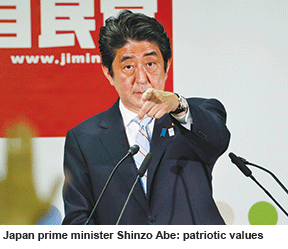IN EAST ASIA, history textbooks are barometers of nationalism, and arguments over them are proxies for disputes between states. So it’s hardly surprising — at a time when territorial disagreements are breaking out all round the South China Sea and East China Sea — that the region is witnessing a new chapter in a long-running argument over how history is taught. This time, though, the bickering has spread beyond Japan and China, its usual homes. And, in addition to their international implications, the textbook disputes have taken on a strong domestic character.
 The new round begins in Japan — inevitably since the country’s imperial aggression leading to its defeat in 1945 has long provided the starting point for disputes. In its manifesto for the election of December 2012, the Liberal Democratic Party promised to restore “patriotic” values to education and called current textbooks “ideologically prejudiced expressions based on self-torturing views of history”. Many academics and teachers were disturbed.
The new round begins in Japan — inevitably since the country’s imperial aggression leading to its defeat in 1945 has long provided the starting point for disputes. In its manifesto for the election of December 2012, the Liberal Democratic Party promised to restore “patriotic” values to education and called current textbooks “ideologically prejudiced expressions based on self-torturing views of history”. Many academics and teachers were disturbed.
After winning by a landslide, the prime minister, Shinzo Abe, set up a panel to rewrite textbooks to make clear where there is lack of agreement on historical interpretation — “a backdoor way of limiting references to Japanese aggression”, says Daniel Sneider, at Stanford University, who studies Asia’s textbook battles. The panel also says it wants to get rid of Japan’s “neighbouring-country clause” — a self-denying ordinance which instructs historians to take into account the sentiments of neighbours (meaning China and South Korea) when writing textbooks.
Neighbouring countries have reacted with predictable outrage. When Japan proposed teaching that the Senkaku islands are part of its territory, China (which claims them as the Diaoyu islands and is challenging Japanese control) urged Japan to “respect historical facts” (which happen not to confirm the Chinese claim). When Japan decided to teach that Takeshima belongs to Japan, South Korea, which controls the group of islets and calls them Dokdo, called this “false history (which) plants enmity and seeds of conflict”. China and South Korea are livid about Japan’s scrapping the neighbouring-country clause.
The debate about history raging in Japan is echoed in South Korea and Taiwan. Last year, the National Institute of Korean History (NIKH), a state-run body which oversees the compilation of the country’s history textbooks, approved a new high-school textbook for publication written by “new right” scholars, who are sympathetic to the achievements of South Korea’s military dictatorships.
The ruling party has also proposed that all schools should be required to use a single state-approved textbook rather than (as now) be able to choose among private publishers’ texts subject to NIKH approval. As in Japan, such a move would extend political control over textbook use.
But the new textbook wars also have a domestic flavour. They are disputes within countries as well as between them. The proposals in Japan reflect a tussle over education: the ruling party says it wants to end 60 years of “left-wing control” over schools. And to complicate matters in South Korea, some new-right scholars are actually sympathetic to Japan’s colonial rule in Korea, a view the government cannot possibly be seen to be condoning.
(Excerpted and adapted from )